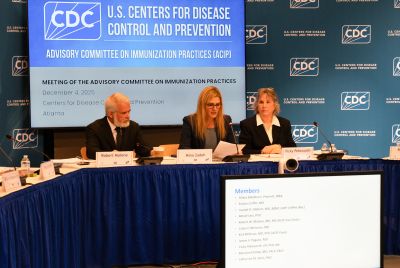Louisiana Surgeon Ralph Abraham Becomes CDC's Second-Highest Official Amid Vaccine Controversy
Newly Appointed CDC Deputy Director Sparks Criticism Online

Dr Ralph Lee Abraham, Louisiana's first Surgeon General, has been named as the new principal deputy director of the Centers for Disease Control and Prevention (CDC). However, the US government organisation's decision has drawn immediate criticism from public health experts.
Vaccine Policy Shift
Last year, Dr Abraham drew criticism after he publicly urged his health department to stop promoting mass vaccinations against the flu, COVID-19, and mpox. The new deputy director also tried to stop a vaccination campaign during last year's flu outbreak.
In a memo to staff, he argued that public health should respect personal choice and doctor-patient conversations rather than a broad 'one size fits all' messaging. His move sparked concern among public health experts, especially during an influenza surge in the state.
Critics Raise Concern, Credentials Spark Debate
Dr Abraham's critics have questioned his suitability for such a high-level CDC role. Some former CDC officials described him as unqualified, especially given the agency's history with emergency response.
There is also no public evidence that Dr Abraham is board-certified in family medicine despite being presented as a family physician in some of his bios, according to a report by WWNO. This has raised further doubts about whether he has the specialised training one might expect in a top public health leadership role.
Implications for US Public Health Strategy
Abraham's appointment comes at a pivotal moment. The CDC currently operates under an acting director, which means he will wield substantial influence for the foreseeable future.
Under this new leadership, some fear the agency may shift away from traditional vaccine promotion and public health strategies. Dr Abraham's philosophy of 'individual choice over mass campaigns' could mark a turning point in how the CDC balances public messaging and individual autonomy.
What This Means for the Public
Supporters of Dr Abraham argue that this change reflects a needed recalibration of public health policy, where one respects personal decision-making and rebuilds trust between citizens and health institutions. Dr Abraham himself has emphasised restoring trust in medicine by focusing on transparent data, balanced communication, and the doctor-patient relationship.
However, many public health advocates caution that in a time of rising infectious diseases, reduced promotion and outreach may hamper efforts to build herd immunity, the widespread resistance to a disease that occurs when a high proportion of a population is immune, and control outbreaks. Critics warn that this could disproportionately impact vulnerable communities that rely on public campaigns and accessible vaccination services.
Public Outcry
The appointment prompted a swift backlash on social media, with many questioning the CDC's decision.
Timothy Caulfield, a professor of health law and science, wrote on X, formerly Twitter, that he was not thrilled to learn that Abraham will now have more influence within the organisation.
The darkness descends.
— Timothy Caulfield (@CaulfieldTim) November 25, 2025
If this wasn't so deadly, it would almost be comical. How much worse can it get? Every day brings a new head-shaking horror.
Louisiana health official who halted state vaccine campaign tapped as CDC’s No. 2 https://t.co/acgfr2AsTv
'The darkness descends. If this wasn't so deadly, it would almost be comical. How much worse can it get? Every day brings a new head-shaking horror,' he wrote, sharing a headline that read: Louisiana health official who halted state vaccine campaign tapped as CDC's No.2'.
Ralph Abraham is an irresponsible pick as Deputy Director of CDC. As Louisiana Surgeon General, he cancelled vaccine campaigns. He's a major prescriber of ivermectin for COVID-19. Dr. Abraham is likely to further erode the credibility of the CDC. He's a loyalist, not a scientist
— Lawrence Gostin (@LawrenceGostin) November 25, 2025
Another user posted. 'Ralph Abraham is an irresponsible pick as Deputy Director of CDC. As Louisiana Surgeon General, he cancelled vaccine campaigns. He's a major prescriber of ivermectin for COVID-19.'
'Dr. Abraham is likely to further erode the credibility of the CDC. He's a loyalist, not a scientist,' a third person posted.
© Copyright IBTimes 2025. All rights reserved.





















